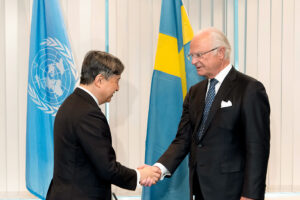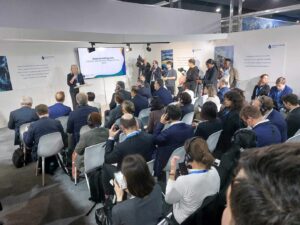Media Advisory: Leaders meet in Stockholm to discuss global water crisis at World Water Week
Stockholm (24 August 2017) – World leaders, water experts, development professionals and CEOs will meet in Stockholm 27 August-1 September for the annual World Water Week, where they will discuss the world’s growing water challenges and how to meet them.

The 2017 World Water Week will be held under the theme Water and waste: reduce and reuse, which resonates with an increasing number of people around the world.
A growing world population and more unpredictable weather patterns will increase uncertainty around the availability and quality of water. It has been felt, for example, through a prolonged drought in California, in unusually high temperatures and drought in southern Europe, and in a devastating and deadly lack of rain in the Horn of Africa. Participants at World Water Week will focus special attention on how to mitigate the growing water uncertainty in many parts of the world, discussing how we can develop and sustain both technologies and behaviour that helps us thrive in an increasingly water scarce future.
One key objective of World Water Week is to track water in the implementation of the 2030 Agenda for Sustainable Development. Each year at the Week, decision-makers will have the opportunity to take stock of water’s role in the implementation of the water-related SDGs and the Paris Climate Agreement, with the aim of ensuring water is part of the solutions.
At World Water Week, today’s complex water challenges will be addressed by some 3,000 participants from nearly than 130 countries, representing governments, the private sector, multilateral organizations, civil society and academia. Speakers at the opening session at 09:30 CET on 28 August include Peter Thomson, President of the United Nations General Assembly; Kevin Rudd, Former Prime Minister of Australia and Chair of Sanitation and Water for All; Karolina Skog, Minister of Environment, Sweden; Karin Wanngård, Mayor of Stockholm; Christer Fuglesang, Astronaut and Member of the Sweden’s Royal Academy of Science; and the 2017 Stockholm Water Prize Laureate Stephen McCaffrey. The event will be livestreamed.
Water is key to a range of issues that will shape the world in the decades to come. They will be discussed in-depth during World Water Week:
Water and climate: Climate change is to a large extent water change. Water disasters account for more than 90 per cent of the natural disasters in the world and climate-driven water hazards, water scarcity and variability pose significant risks to all economic activity, such as food and energy production, manufacturing and infrastructure development, as well as political stability. This is also true for high income countries. Resilience to climate change requires adaptive water management and robust water infrastructure
Sustainable Development Goals: Nearly all the sustainable development goals will require water to be achieved, and implementation will need to be integrated and coordinated. Water can help to facilitate this. For example, energy and food security, as well as economic growth and urbanization (SDGs 2, 7, 8, and 11) are directly dependent on the availability of freshwater resources.
Water as connector between the SDGs and the Paris Agreement: In the 2030 Agenda for Sustainable Development, the water and sanitation SDG (Goal 6) links across all the other 16 Goals with a great number of water related targets in the overall Agenda; making water a key underlying factor and entry point for the successful implementation of the 2030 Agenda. For the Paris Agreement, most of the countries who submitted their Nationally Determined Contributions (NDCs), prioritized water in their adaptation chapters, before agriculture and health. This positions water as a priority for national policy, program implementation and funding.
Drinking water and sanitation: The global water and sanitation crisis is mainly rooted in poverty, power and inequality, not in physical water scarcity. It is, first and foremost, a crisis of governance. Poor resources management, corruption, lack of appropriate institutions, bureaucratic inertia, and insufficient capacity lie in many places behind the lack of sustainability of services, which also undermine the arrival of new investments. Better water governance is needed for enhancing sustainability of services and attracting more investments into the sector.
Water security: To manage the global rise in demand for water and to increase water productivity, incentives for using water more effectively are necessary. Water needs to be given its true value for production purposes in the energy, industry and agriculture sectors.
Water and food/nutrition: Although prevalence is declining, an estimated 800 million people are still undernourished. A worrying opposite trend is a rapid growth of overeating: well over 2 billion are now overweight, obese or are negatively affected by diets that are less healthy. This kind of New Normal and mal-development is a global phenomenon with the most rapid increase among young people, and notable also among the poor.
Innovative financing and green bonds: A great deal of (sustainable and climate smart) finance will be needed for both supplying water and treating waste water, but these investments to increase resilience to climate change will be much cheaper than the emergency responses which a future changed climate will require in terms of food security and human health. An investment in climate-proof infrastructure today will be offset by a future reduced need for emergency response measures to counter floods and droughts.
Water cooperation: Development needs cooperation. Cooperation over transboundary waters would spur regional development, improve resilience to climate change, and decrease the risk of geopolitical hostility. The political aspects of transboundary cooperation cannot be neglected if real progress is to be made.
Water integrity: Corruption is one of the most serious challenges to sustainable management of water resources management and provision of water services. It reduces economic growth, discourages investment, increases the services delivery costs, increases health risks and robs poor people of their livelihoods and access to water.
On pricing of water and valuing water: Water needs to be better valued. Some parts of this value can easily be reflected in a price, others cannot. Therefore, water pricing needs to be complemented with other types of policy instruments (such as laws, public awareness raising, or standards). Especially, we need to make sure that basic water services are affordable also to the poorest people, as per the human right to water and sanitation, and that water continues to keep ecosystems healthy.
Water and migration: Increasingly, researchers and policymakers are seeking to explain migration and refugee flows in terms of water scarcity – often perpetuated by climate change. The interlinkages between water challenges and climate change manifested in the form of, for example, increased variability and uncertainty, are not the main causes of large-scale population migration. Rather, they should be considered as push factor multipliers. Social, economic, and political factors will also affect the vulnerability or resilience of communities.
Water and faith: Water has profound symbolic meaning in many religious and local traditions and water stress is particularly acute in many parts of the world in which faith is a central aspect of individual and community identity. Water governance and development are not only about policies and investments but rooted in behaviour change and cultural values. In that respect, the role of Faith Based Organizations (FBOs) becomes crucial given their presence and influence in local communities.
Pharmaceuticals and water: Active pharmaceutical ingredients (APIs) are micro-pollutants, and are of growing concern around the globe. Manufactured to be stable enough to reach and interact with the relevant organ, many pharmaceuticals are not easily biodegradable and remain in the environment for considerable periods of time.
During World Water Week, Stockholm Water Prize will be awarded to Professor Stephen McCaffrey, who receives the 2017 Prize for his unparalleled contribution to the evolution and progressive realization of international water law. The Prize ceremony will take place on Wednesday 30 August at Stockholm’s City Hall, where Stephen McCaffrey will receive the Prize from H.M. King Carl XVI Gustaf, patron of Stockholm Water Prize.
The winner or winners of Stockholm Junior Water Prize will be announced on Tuesday 29 August. The final welcomes 64 winners of the national competitions in 33 countries. The winner(s) will receive the prize from H.R.H Crown Princess Victoria of Sweden during a ceremony at Grand Hotel in Stockholm.
Press contact: Rowena Barber, Communications Manager, SIWI, rowena.barber@siwi.org,
Tel+46-8-12136039
About SIWI: SIWI is a water institute, working to improve the way freshwater resources are governed. By combining its areas of expertise with its unique convening power, SIWI influences decision-makers, facilitates dialogue and builds knowledge in water issues, thereby contributing to a just, prosperous and sustainable future for all.
SIWI organizes the world’s most important annual water and development meeting, World Water Week, and it awards the Stockholm Water Prize and Stockholm Junior Water Prize.
About World Water Week: World Water Week is the largest annual meeting for water and development issues, organized by Stockholm International Water Institute (SIWI). The Week brings together more than 3,000 participants from nearly 130 countries representing actors from governments, private sector, multilateral organizations, civil society and academia to shape joint solutions to global water challenges.
Note to Editors:
- Information about World Water Week and Stockholm International Water Institute; worldwaterweek.org and siwi.org
- Online programme: http://programme.worldwaterweek.org
- Press briefings, press releases and interview requests: http://www.worldwaterweek.org/pressroom
- Video: https://siwi.org/mediahub, http://www.youtube.com/SIWI_water
- Livestream: https://siwi-mediahub.creo.se/world-water-week/2017-water-and-waste-reduce-and-reuse/opening_ceremony
- Pictures: https://www.flickr.com/photos/siwi_water
- Twitter: @siwi_water, #WWWeek
- Facebook: Stockholm International Water Institute
- Instagram: siwi_water
Suggested reading:
- WaterFront 2-3/2017 focused on water reuse: https://siwi.org/publications/stockholm-water-front-no-2-3-2017/
- SIWI’s latest policy brief: https://siwi.org/publications/freshwater-oceans-working-together-face-climate-change/







